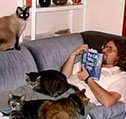Inheritance. |
Philosophy
and Nonsense
(Thoughts about writing,
education, and experience.)
Presented by Forrest D. Poston
 The first goal of teaching is to strengthen, deepen and refine our intrinsic love of learning. All other goals and all methods must stem from that idea. Any that do not support that goal must at least be questioned and adjusted, if not eliminated. Otherwise, we are not teaching but training. Think, I dare you.
|
Stories, and that
has made all the difference. |
|
Conservation of Mistakes
by Forrest D. Poston We say that we should learn from our mistakes and even recognize that we often don’t learn without making mistakes, but we mostly give lip service only without stopping to consider what these ideas mean or how to apply them. As so often happens, the idea has become so well known that it’s taken for granted as if we will automatically learn without actually having to use a little time and brain power. And so we repeat mistakes and come up with “new and improved” mistakes, still managing to ignore the pattern, the root cause, or the relatively simple cure. That much of the idea has been bouncing around in my head for years, but a bit was missing, a piece that fell into place during a conversation with a bagger in the supermarket check out line. Two workers were coming to the end of a conversation when I entered the line, and a bit caught my ear, leading me to cut in after one admitted being wrong. I pointed out that admitting being wrong was what made it possible to learn. He agreed but added, “I learned the wrong thing.” That’s when The Conservation of Mistakes began to take shape. He had actually already learned two things via his initial mistake: the fact that he was wrong and the fact that he had learned the wrong lesson. Realizing that he had learned the wrong lesson meant he now had the awareness to pursue the right lesson. Becoming aware of that was the third lesson, and figuring out the “right” lesson would then be the fourth in the series. If we actually take the time to learn as many lessons as possible from a mistake, then we not only don’t need to repeat that mistake but should be able to avoid others. That includes some of the lessons learned with a bit of reflection even years later….as long as we avoid the mistake of getting trapped in the past. Learning is maximized, and mistakes are minimized. In theory, that means we will not only make fewer unnecessary mistakes but avoid the big ones that cause the greatest emotional or physical pain, right up to those mistakes that land us in the hospital or find us planted in our own small plot of ground. E-mail Back to the Home Page |
Writing and Education Autobiography Challenge Considering Conclusions Considering Introductions Four Meanings of Life Godot and the Great Pumpkin A Major is More Minor Than You Think The Poetry Process (A look at 4 versions of a poem.) Thoughts About Picking a Major Quick Points About Education Quick Points About Writing Reading Poetry and Cloud Watching Revising Revision Reviving Experience Reviving Symbolism Using an Audience Videos What Makes a Story True? What's the Subject of This Class? (Being revised.) Why Write? Writing and Einstein (The Difference Between Information and Meaning) Writing and the Goldilocks Dilemma Links to Other Sites |
Other Essays and Poetry Something Somewhat Vaguely Like a Resume Alec Kirby, Memories of an Earnest Imp Being Like Children Beyond the Genes (Dad) The Blessing and the Blues Bookin' Down Brown Street The Cat With a Bucket List David and the Revelation The Dawn, the Dark, and the Horse I Didn't Ride In On (an odd, meandering, semi-romantic story) Getting a Clue Ghost Dancer in the Twilight Zone The Hair Connection and the Nature of Choices I Believe in Capra The Mug, the Magic, and the Mistake Roto, Rooter and the Drainy Day Sadie on the Bridge Trumpet Player, USDA Approved Videos Poetry Selected Poems The Poetry Process Links to Other Sites |